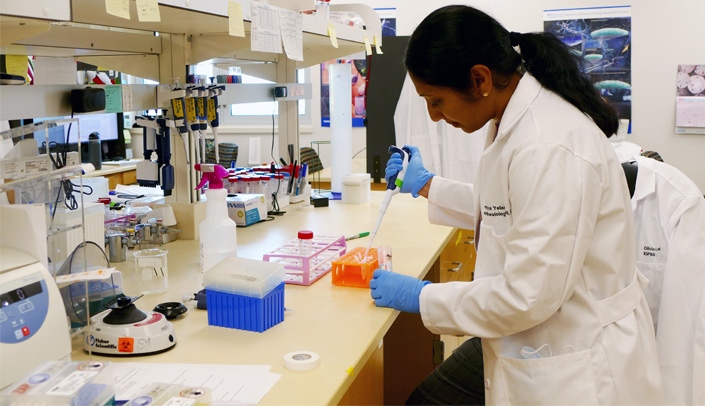Sowmya Yelamanchili, PhD, associate professor in the UNMC Department of Anesthesiology, was awarded a five-year National Institutes of Health research grant to study the correlation between methamphetamine and HIV-associated neurocognitive disorders (HAND) using lab-grown 3D models of the human brain — commonly known as cerebral organoids.
"The mechanism by which meth exacerbates HIV progression in the brain and contributes to HAND is not completely understood," Dr. Yelamanchili said. "This is partly because there are limited models to study HAND and comorbidities."
Meth is a highly addictive stimulant that increases dopamine concentrations in the brain, leading to euphoric effects. "It is one of the most abused drugs in Nebraska, with over 35 million users worldwide, and poses both a local and global threat," Dr. Yelamanchili said.
HIV-infected individuals who are meth users have a higher rate of neuropsychological impairment compared to only meth users alone or HIV patients without meth abuse. Because HIV and meth both affect the central nervous system, it’s important to understand the interaction between the two.
In collaboration with Peng Jiang, PhD, associate professor at Rutgers University, Dr. Yelamanchili’s laboratory developed brain organoids to study such complex comorbidities. These "mini-brains" have an anatomical structure similar to human brains and are derived from induced pluripotent stem cells, which are created by taking adult human skin cells and reprogramming them to create these specialized cells. The "mini-brains" recapitulate various milestones of neuropathogenesis observed in an adult human brain.
"We have now specialized in culturing brain organoids with brain immune cells or microglia," Dr. Yelamanchili said. "With the help of these robust models as tools, we hope not only to close some important knowledge gaps in the HIV/drug abuse field but also expand novel therapeutic interventions."
Karsten Bartels, MD, PhD, vice chair of research in UNMC’s Department of Anesthesiology, offered his congratulations: "This is truly a remarkable achievement that only comes on the shoulders of hard work and tenacity. This is well-deserved recognition and success for an exceptional scientist."

This is excellent! Contratulations to Dr. Yelamanchili and her lab!
Fantastic work, Dr. Yelamanchili
Congratulation with exiting work!
Congrats Dr. Y!!
Congratulations!
Congratulations! This is really exciting work.
This is so exciting! Congratulations Dr. Yelamanchili!
Congratulations Sowmya! So happy to hear that you and Peng are still working together. I wish you continued success.
Thank you all for your kind comments!
Congratulations Sowmya💐.
Congratulations Dr Yelamamchali 👍👍
Very great and excellent achivement